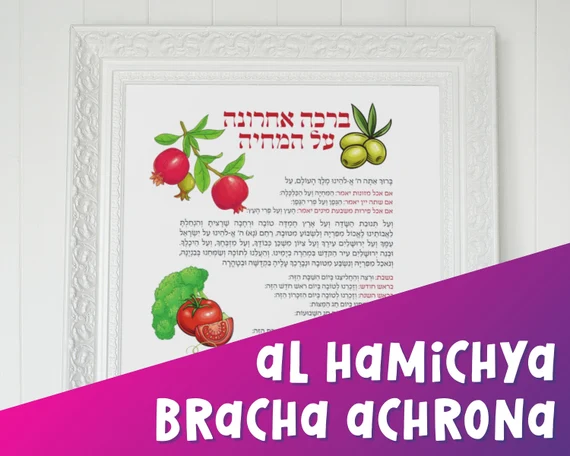Post-Consumption Blessing
After consuming food or drink, one should express gratitude to Hashem for providing sustenance. Chazal instituted different texts for the bracha achrona, or final blessing, based on the type of food or drink consumed. There are specific conditions necessary for being obligated to recite this blessing, including the volume of food consumed and the timeframe within which it was eaten.
Minimum Measures for Bracha Achrona Obligation
Food:
- A person is obligated to make a Bracha Achrona if they eat a Kezayit of food within the time frame of Kedi Achilat Pras.
- Kedi Achilat Pras: Generally, this is considered to be 4 minutes. Rav Ovadyah Yosef and Or Letzion have different views, extending this time to 7.5 minutes and 6 minutes, respectively, in certain situations.
- Complete Fruit/Nut: Although there’s an opinion that a bracha achrona is required even for less than a Kezayit if a complete fruit or nut is eaten, the halacha does not follow this view. To avoid complications, one should not eat a complete fruit or nut unless intending to consume a Kezayit.
- Food in Teeth: Food stuck in one’s teeth does not count towards the measure needed for a bracha achrona.
Drink:
- One must recite a Bracha Achrona if they drink a Revi’it of liquid within the time it takes to drink a Revi’it.
- Kedi Shtiyat Reviyit: Mishna Brurah suggests this is the time it takes to drink a Revi’it in two sips, while others like Rav Ovadyah Yosef and Sefer Birkat Eliyahu provide different timeframes, including approximately 12 seconds.
- To avoid doubt, it is recommended not to drink any amount between a Kezayit and a Revi’it.
Specific Brachot Achronot
Boreh Nefashot:
- This blessing is said after consuming a Kezayit of fruits, vegetables (not of the seven species with which Israel is praised), or non-plant-based foods.
- If both food and drink require Boreh Nefashot, only one blessing is said to cover both.
- The text of Boreh Nefashot includes a specific phrasing with slight variations in pronunciation between Ashkenazi and Sephardic traditions.
Combining Foods:
- If someone ate half a Kezayit of one type of food requiring a Mein Shalosh blessing and half a Kezayit of another type requiring a Boreh Nefashot, a Boreh Nefashot is recited.
- Combining foods of the same blessing type may have different rulings depending on the poskim (Jewish legal decisors).
Order of Brachot Achronot:
- Al Hamichya is generally recited before Boreh Nefashot due to its greater significance.
- For mixed consumption involving foods requiring different blessings, some poskim advise switching the order to ensure all blessings are properly recited.
Coffee or Tea:
- Sephardic practice generally avoids a Bracha Achrona after coffee or tea unless a Revi’it is consumed in the required timeframe. Some Ashkenazic poskim share this view.
Time Frame for Making a Bracha Achrona
Birkat Hamazon (for bread):
- Ideally, one should recite Birkat Hamazon within 72 minutes of eating. If still full, it can be said after this time but not if one feels hungry again.
- For long meals, as long as eating or drinking continues every 72 minutes, Birkat Hamazon can be recited even several hours later.
Other Foods:
- For foods other than bread, the Bracha Achrona should ideally be said within 72 minutes. If full, it can be recited after this period; if unsure, it’s preferable to eat more and then say the blessing.
Drinks:
- The Bracha Achrona for drinks should be said immediately or as long as the thirst is quenched. If uncertain about the timing, it’s better to drink more and then recite the blessing.
Post-Bracha Achrona Consumption:
- If one makes a bracha achrona but still has food stuck in their teeth, they can swallow it without another blessing.
- Mistakenly making a bracha achrona while intending to eat more does not require a new blessing for the subsequent food.
Interruptions and Mistakes:
- One should pause during Bracha Mein Shalosh for responses to Kaddish and Kedusha.
- If the wrong bracha achrona is recited, different poskim offer guidelines for rectifying the situation, often depending on the type of food and the specific blessing made.
Conclusion
The laws of Bracha Achrona are intricate, with various opinions and guidelines from different poskim. Understanding and adhering to these laws ensures proper gratitude is given to Hashem for the sustenance provided.




